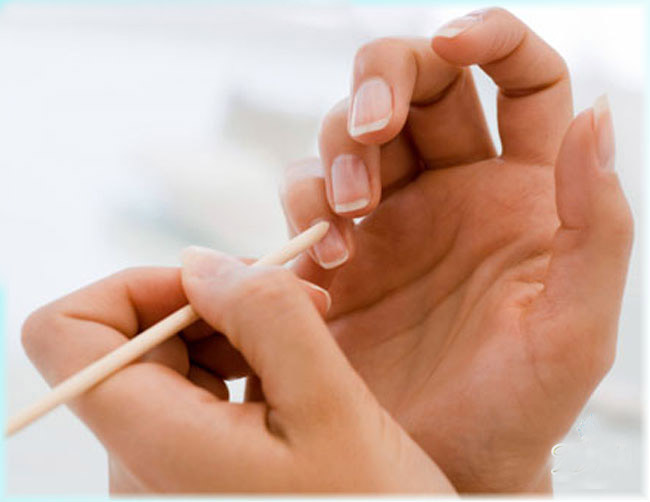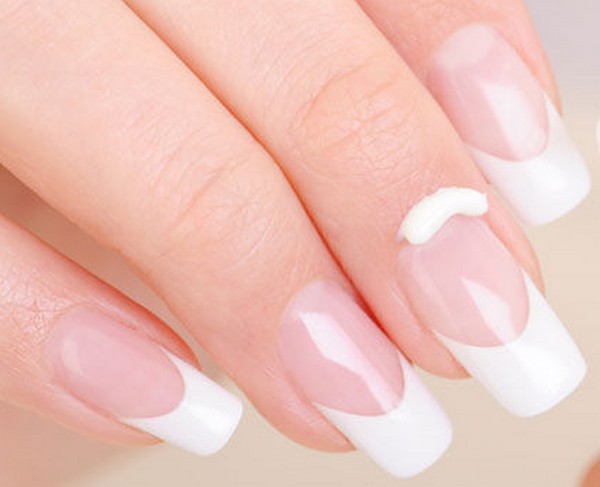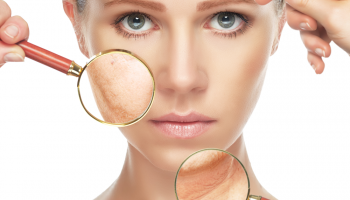
Cuticles are part of the skin that sit atop your nails’ growth matrix, which is the part of your nails that grows. They serve like a barrier or a protection for the nail matrix.
If you look at your nail the cuticle is the thin ledge right at the base of your nail. It looks like your nail starts growing from the cuticle but it doesn’t, the nail root is further down.
| Cuticles are part of the skin that sit atop your nails’ growth matrix, which is the part of your nails that grows. They serve like a barrier or a protection for the nail matrix.If you look at your nail the cuticle is the thin ledge right at the base of your nail. It looks like your nail starts growing from the cuticle but it doesn’t, the nail root is further down. |
To keep the cuticle healthy and protected.
- Do not cut the Cuticle: Cutting them could open the door to infection or irritation. It can also lead to nail problems, such as ridges, white spots, or white lines. A bacterial infection in that area, can hamper the fingernail’s growth.
- Use Sterilized Orange Stick: If you wish to make your nails appear longer, you can push your cuticles back gently with a wooden orange stick.Cuticles should not be cut, They’re supposed to be soft, and cutting can make them hard, more likely to fracture. If you cut it, it has an increased tendency to split off. Some people who cut their cuticles regularly are afraid to stop, because they worry that their cuticles will grow and grow, giving their hands an unsightly look. Cutting the cuticle doesn’t make it grow faster. Nothing you can do can change the rate of growth.

- Moisturize: Although the cuticles don’t feel like the soft skin on the rest of your hands, they’re composed primarily of skin, so it’s essential to keep them moisturized. A good moisturizer for the cuticles is important, just like for dry skin. Any skin moisturizer will work fine for the cuticles. When you put it on your hands and there’s some left over, rub it into the cuticles. The American Academy of Dermatology recommends petroleum jelly (Vaseline) as an inexpensive way to care for the cuticles. A hot wax treatment, which may be offered at the nail salon, is another good way to moisturize the cuticles. Special oily wax is heated until it melts. People dip their hands into the warm, oily wax, then put on plastic gloves and a mitt to seal in the heat, which they wear for 10 to 15 minutes. Whatever method you choose, be sure to moisten your hands regularly.
- Avoid Rough Manicurists: Many people see their dermatologist when they develop red, sore spots around their nails or cuticles caused by a skin infection called paronychia.
Before getting your manicure done, tell your manicurist that you only want your cuticles pushed back very gently with an orange stick, nothing more. If she pushes the cuticles too vigorously, ask her to stop right away. - Never Pull on a Hang nail: These occur generally towards the top of your nail, which tear down the sides and seem to never end if you pull them. The best way to get rid of it is to nip it with your cuticle nippers at an upward angle and then apply cuticle oil to help moisturize the area. Make sure to push the cuticles on the sides of your nails when you do your regular routine.
- Stay Away of Drying Agents: The hands, nails, and cuticles can dry out from frequent dish washing and from nail polish remover containing acetone. So, experts recommend wearing gloves for dish duty and using acetone-free nail polish remover. Wear vinyl gloves while performing household routines . Having the gloves on keeps the oil on the cuticle and nail plate, and it protects them from the drying effects of water.
- Do not put finger in your Mouth: Your mouth is a dirty area, and saliva is an enzyme that breaks down skin. If you have a habit of biting your nails or nibbling on your cuticles, work on kicking those habits for prettier, healthier hands.
- See your doctor about a diabetes screening if you get frequent nail infections.
Before you make that next trip to get a manicure or pedicure, heed this advice.
Related Links
Disclaimer
The Content is not intended to be a substitute for professional medical advice, diagnosis, or treatment. Always seek the advice of your physician or other qualified health provider with any questions you may have regarding a medical condition.
